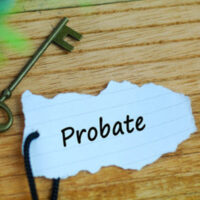Differences Between Probate and Non-Probate in Florida

Even if you have a Will, not everything will pass through probate when you die. It’s important to understand how your Florida estate planning can ultimately affect your estate administration when you pass away. Assets that go through probate are ones that have no way to pass from a deceased person to a living beneficiary without going through a Court-supervised probate administration. Arguments over what is and what is not subject to probate can often arise when a loved one passes away. If you need assistance resolving a probate administration related dispute, it’s time to contact an experienced Pompano Beach estate and trust litigation attorney.
Examples of Probate Assets
To better understand what in your estate might be subject to probate, here’s a look at some of the most common assets that pass-through probate.
- Real property that is titled only in the deceased’s name or is listed as tenant in common;
- Bank accounts solely in the deceased’s name;
- Interest they had in an LLC, corporation, or partnership;
- Personal property like automobiles, boats, jewelry, artwork, furniture, etc.
- A life insurance policy that doesn’t list another person as a beneficiary, becomes payable to the Estate.
Examples of Non-Probate Assets
Non-probate assets are ones that won’t go through probate before they are distributed. In most cases, they are typically assets that are jointly owned or assets that have beneficiary designations. Some common types of assets that don’t go through probate include:
- Retirement plans;
- Life insurance proceeds;
- Joint bank accounts;
- Real estate jointly owned with another person, titled as joint tenancy with rights of survivorship;
- Joint bank accounts;
- Trust assets; and
- Any other account or asset with a payable on death beneficiary.
Any accounts or assets that have named beneficiaries like payable on death accounts will be distributed according to what the designation says. Your will does not affect the beneficiary designations that are in place. This is why it’s so important you make sure your named beneficiaries are always up to date.
Probate vs. Non-Probate Assets
One main benefit of non-probate assets is that the named beneficiaries will be able to access their inheritance right away. Bypassing probate can also help reduce the risk of potential disputes. With a Will, you always run the risk of an estranged relative coming forward to contest the Will.
When there is a discrepancy between your probate and non-probate assets, it can result in significant problems for your heirs. Probate litigation is complicated, and you should not attempt to handle disputes on your own. You need a skilled Florida probate litigation attorney who can assist.
Contact a Florida Estate and Probate Litigation Attorney
If you are an estate’s personal representative or an heir, you may be dealing with arguments during the estate administration process. Disputes can take an emotional toll on everyone involved, and they can financially drain the estate. Don’t let arguments put the estate’s assets at risk; let us help. Contact Mark R. Manceri, P.A. today to schedule an initial consultation.
https://www.estateprobatelitigation.com/category/estate-trust-litigation/
